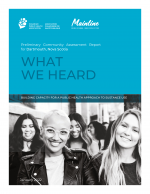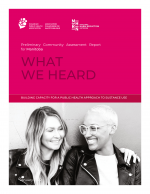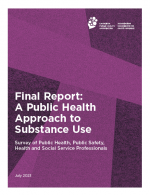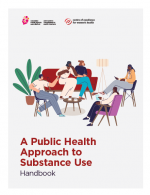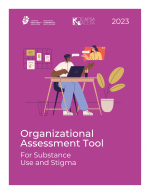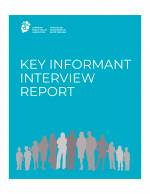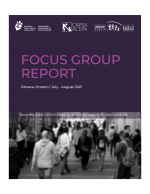-
Normalizing Conversations: Engaging public health, public safety, and communities to build capacity for a public health approach to substance use

CPHA has been funded by Health Canada through the Substance Use and Addictions Program to undertake a project to build the knowledge and capacity of decision-makers, health and social service providers, public safety and communities to implement a public health approach to substance use.
The primary objective of this project is to build the knowledge and capacity of communities to implement a public health approach to substance use. This is being accomplished through collaboration with individuals with lived and living experience of substance use, various professionals, and community organizations across Canada.
As part of this project, CPHA has developed a national, bilingual online substance use resource centre - the Canadian Substance Use Resource and Knowledge Exchange Centre (SURE). SURE provides a curated series of tools and resources to support you in implementing a public health approach to substance use in your community.
This site aims to facilitate learning for practitioners, program planners, policy makers, peer workers, and other professionals. You can sign up for a free account on the SURE website to stay updated on new resources added to the site, bookmark those most relevant to you, and save specific search criteria for the next time you visit.
There are a variety of topics on SURE including harm reduction, resources by people with living experience of substance use, prevention and health promotion, justice and public safety, and so much more. You can use the ‘Find a Resource’ tool on SURE to browse by topic, resource type, or source.
To stay up to date on the latest resources added to SURE and new learning opportunities, sign up for our bi-weekly newsletter.
Project Partners
CAPSA (Community Addictions Peer Support Association): CAPSA is a national leader on the topic of stigma, its impacts on individuals who use substances or have a substance use disorder, and on identifying and correcting instances of systemic stigma embedded in organizations. Employing subject matter experts with living experience, CAPSA works with organizations to provide education around substance use, stigma related to substance use disorder and the use of person-first language to reduce stigma and discrimination.
- Role in the project
In 2022, CPHA and CAPSA signed a memorandum of understanding (MOU) to formalize the collaborative work between the two organizations. Members of the CAPSA and CPHA substance use project teams are committed to meeting bi-weekly throughout the course of the Normalizing Conversations project to develop shared initiatives and collaborate on resource development. This partnership is essential to the project’s goal of implementing a public health approach to substance use that is informed by the expertise of people with living experience.
Community Engagement Partners
Roles in the project
In 2021, CPHA engaged with community members in either a focus group or individual format to better understand the range and availability of substance use services in each community, explore what the communities would like to see to better support people who use drugs, and identify next steps to close the gaps between current and desired states for a public health approach to substance use. This included 26 people from the Dartmouth area, 23 people from Manitoba, and approximately 40 people from Thunder Bay. In the spring of 2022, CPHA hosted knowledge exchange forums in each community to bring together people who use drugs, allied health and social service providers, and first responders to brainstorm different approaches this project can take to address each community’s prioritized needs. These forums will help to inform the future work of the project.
|
About Mainline Needle Exchange (Nova Scotia): |
|
About Manitoba Harm Reduction Network (Manitoba): |
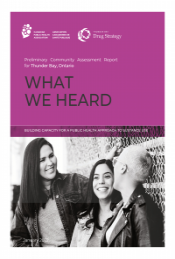 |
About Thunder Bay Drug Strategy (Ontario): |
Project Tools and Resources
| Canadian Substance Use Resource and Knowledge Exchange Centre (SURE). SURE provides a curated series of tools and resources to support you in implementing a public health approach to substance use in your community. |
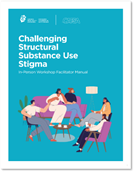 |
Challenging Structural Substance Use Stigma Workshop Package - 2024 The workshop can be delivered online or in person, in one 6-hour session or two 3-hour sessions and was designed for groups of 10 to 25 participants. The package has all the materials and supporting documents needed to deliver the workshop in your organization or community. Find it on SURE! |
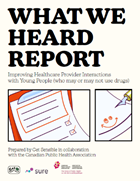 |
What We Heard Report: Improving Healthcare Provider Interactions with Young People (who may or may not use drugs) – 2024 This report presents findings from a peer-led engagement initiative focused on examining the relationship between healthcare providers and young people, aged 18-30, who use drugs in Canada. Written by young people who use drugs (YPWUD), this report aims to shed light on the challenges faced by YPWUD when accessing healthcare services and to propose strategies to foster more meaningful and supportive connections between YPWUD and healthcare providers. Find it on SURE! |
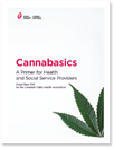 |
Cannabasics: A Primer for Health and Social Service Providers– 2023 In partnership with the CPHA, the Cannabasics Information Package, initially published in 2018, has been updated by Dr. Daniel Bear, a cannabis researcher with nearly 20 years’ experience studying drug policy. Find it on SURE! |
|
Final Report: Survey of Public Health, Public Safety, Health and Social Service Professionals on a Public Health Approach to Substance Use – 2023 As part of the Normalizing Conversations project, the project team conducted a survey of public health, public safety and health and social service providers to better understand key stakeholder beliefs and attitudes, knowledge levels, and access to information, resources and training about substance use. Find it on SURE! |
|
|
A Public Health Approach to Substance Use Handbook – 2023 |
|
|
Organizational Assessment Tool for Substance Use and Stigma – 2023 This tool was developed in partnership with CAPSA to help organizations identify policies, along with environmental and cultural factors that contribute to substance use stigma and discrimination. It can assist organizations in developing strategies for reducing stigma to create safer, more supportive environments and build policies and practices that are supportive and inclusive for staff, volunteers and individuals seeking care. Find it on SURE! |
|
Key Informant Interview Report – November 2022 Between March of 2020 and January of 2021, CPHA interviewed 17 key informants involved in substance use-related work across Canada. These individuals represented: people who use/d substances, harm reduction and community organization employees, health system professionals (both public health and acute care), public safety professionals, academics, and non-governmental organization (NGO) employees and volunteers. The summary of findings is organized as follows:
|
|
Focus Group Report with Somerset West Community Health Centre (SWCHC) & CAPSA – August 2021 In July and August of 2021, CAPSA, CPHA, and Somerset West Community Health Centre facilitated several focus groups with people who access substance use care to gain their perspectives on how their health needs and goals are addressed. We want to thank each person with lived or living experience from across the country who shared their experiences and knowledge with us through these focus groups. We recognize and value the expertise that each of these individuals hold and appreciate the range of perspectives they have contributed. |
Online learning
You can create an account on CPHA’s learning site to access free online courses.
Courses currently available from the Normalizing Conversations project are:
- Cannabasics: An Introductory Online Learning Series
In this introductory learning series, you will explore basics of the cannabis plant and products, different methods of consumption, and different reasons for consumption from a public health approach. A compilation of links to cannabis-focused harm reduction resources is also available at the end of the learning series. Completing the course in full will take approximately 1 to 2 hours.
Webinars
Join us for our webinar series as we discuss current and emerging topics in substance use. This series is primarily intended for professionals working to protect and promote the health, wellness, and safety of people who use substances.
‘Beyond Stigma’ In April 2022, CPHA and SURE presented a panel discussion centered around the Subject Matter Health Research Lab’s 2022 animated video ‘Beyond Stigma’, and featured a conversation with some of the videos creators on the realities and impacts of opioid related stigma, and ways that we can move beyond it.
Catch up on previous SURE webinars
-
CPHA's Framework for a Public Health Approach to Substance Use
-
Perspectives on a Public Health Approach | Findings from a National Survey & Tools for Future Work
-
Beyond Stigma Webinar | Treating Pain in Opioid Use Disorder
- Involuntary Stabilization Care of Youth Who Overdose: More Harm than Good (Part 1)
- Involuntary Stabilization Care of Youth Who Overdose: More Harm than Good (Part 2)
- Safer Supply Would Work Well if... Findings from a Concept Mapping Study
- Barriers to Legal Cannabis Access: The Emergence of Community Based Cannabis Distribution Programs in Vancouver, Canada
- Having a Voice and Saving Lives: A Qualitative Survey on Employment Impacts of People with Lived Experience of Drug Use Working in Harm Reduction
- Gender-Informed Virtual Interventions Addressing Substance Use and Intimate Partner Violence
- Reflections on a Public Health Approach to Substance Use

